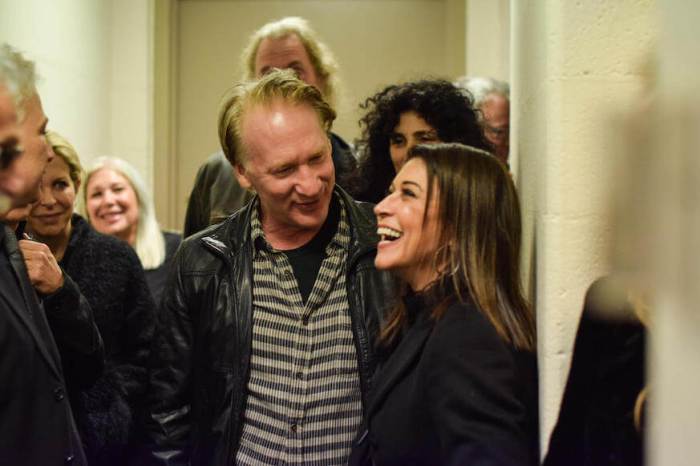Before he was a recurring “Daily Show” guest and a bestselling author — of the fake fact books “The Areas of My Expertise,” “More Information Than You Require” and “That is All” — John Hodgman was a literary agent. Now he wants to transition into something else. In addition to his own, totally truthful and non-fake factoid-fueled podcast “Judge John Hodgman,” he has a new “one-human show.” “Vacationland,” finds him on a stage waxing, semi-philosophically, on the absurdities of whiling away days of alleged relaxation in the cold and forbidding climes of Maine. Even during interviews he’s free to let his mind wander and particularly to seize upon anything remotely approaching morbidity. Do you get a sense that you’ll continue on the “Daily Show” under Trevor Noah’s watch?
I’ve met with Trevor and we’ve talked about it. And I want to give him all the latitude to build the show that makes the most sense for him. I don’t want to be presumptuous. At this point it seems like a possibility, and if I get the call I will say yes. But I want to give him some time to build the show as he sees fit. Let me put it this way: I’m going to give him five episodes. That’s one full week of episodes, plus a Monday. And if it’s not to my liking at that point, I’ll take over. I haven’t discussed this with anyone, but I think that’s pretty reasonable. It could be just a simple trial by combat. Maybe we’ll play a game of Scrabble, but we know how that’s going to go. But honestly, the more likely outcome is you’ll discover, as I already have, that Trevor is super smart and funny and he really will bring an interesting new perspective on what people who watch “The Daily Show” care about. RELATED: How Jon Stewart and “The Daily Show” changed the world He’ll be different, but different, I feel, is good.
That is exactly so. What happens in life — and this is the subject of my show — is you spend your youth feeling a little bit terrified of change and transitions in life. But then, as you reach about 40, you realize we’re all going to end up dead anyway. And you’ve been through enough transitions to realize that some transitions are painful, but you end up in much better places. Let me ask you a question: Have you been to the beach? Not as many as I would have liked.
Pick one beach you’ve been to.
I used to go to Ocean City, New Jersey as a kid.
So did I. You didn’t think it was a nice beach?
It’s fine, but there are almost certainly better ones. Sure. There are always better beaches. But let’s say this: Ocean City, New Jersey. A beach community. Sand, surf, friendly, smiling people. Water you can swim in. Now, consider the beaches of Maine: no sand. Just rocks that want to tear your body apart. Water that if you swam in it you would immediately want to die to end the suffering, due to the coldness. And not very many friendly people. And yet people go there, year after year, and they call that place “Vacationland.” Why? Perhaps it is because deep in their hearts they don’t think they deserve happiness. So it’s the perfect place for that kind of person to vacation in. I thought that was the solution for why I was going there, aside from the fact that my wife loves Maine more than any place or human on earth. Then I discovered that I actually enjoy swimming in that painful water. You go in there, every cell in your body screams a question in your brain, which is: “Why? Why are you doing this? You had a choice. You didn’t have to get in this water.” You really feel like you will shut down. And yet if you spend enough time there and train yourself to enjoy displeasure, it gets better — and, I dare say, lovely. And if you’re a person who enjoys a certain constant level of discomfort in the world anyway, you’re used to it. Swimming in Maine is not recreational, like the swimming in a heated pool. It’s existentially transformational. It teaches you that if you don’t die you can get used to anything. And that is what you learn from Maine: that if you travel through pain you might not get to pleasure but you will get to non-pain. At other times in your life, when you are facing pain, whether it’s emotional or physical, even, you learn through a Maine vacation to dive in and get it over with. We spend a lot of time in our lives fearing that something is going to be painful. We spend a lot of time dodging it. And we don’t live the lives we should be living. That’s how you work as a literary agent for seven years and you realize you should be a writer and a comedian, but you’re afraid of the transition because it involves telling Bruce Campbell — your celebrity client, who spelled my name wrong in the acknowledgements of his book, though I still love him — you fear terribly that telling Bruce Campbell that you’re not going to be his agent anymore will mean that he will hate you and think you’re a bad person and neither of you will get over it. But then he got over it in about 35 seconds. Transitions can be hard and painful and weird and awkward, but there is something that’s always on the other side. And that very often can be good. That is, I guess, why people swim in the oceans of Maine, because otherwise I have no explanations for you. You alluded to transitioning from a literary agent to a writer and performer. Do you see yourself heading in another direction?
I can tell you, in my last standup show that was recorded for Netflix [“Ragnarok”], I predicted the end of the world. You may have noticed that never happened. Very embarrassing for me. It was a moment of personal crisis, because I needed the world to end, because I was out of material. I had written three books of fake material and invented world knowledge. I made up every dumb fact about zeppelins that I could. I loved the material, but I just didn’t want to do that kind of thing anymore. I didn’t know what I could do next or how I could begin doing it. Part of the solution for me was realizing that I had been doing my “Judge John Hodgman” podcast with Jesse Thorn where I was essentially just presenting myself, not as the Resident Expert or the Deranged Millionaire from “The Daily Show” or the cuckoo as in my books. I was just myself. I wasn’t doing any phony fakey fact-type thoughts. I realized I had spent my entire career lying. Could I make a career out of telling the truth and owning up to my real life, in an unapologetic, uncensored way? There was always a part of me that felt I had to apologize for myself as a comedian for not having a troubled childhood, for example, and for not suffering particularly. To the people in the comedy world I may have seemed like an intruder, which I was to some degree. So I hid behind a lot of phony stuff. Instead I started going to a basement here in Brooklyn and doing a somewhat weekly secret show and doing whatever I needed to fill the time. The revelation was that I could just tell stories that were true about my own life and all my weird misadventures that my truly motley career takes me on. So I spent a year, from 2014 to early 2015, doing a different show that I never wanted to record, because I just wanted to tell real stories on stage with other humans, and conjure something that night every night. It was the first time I had written for the stage as opposed to a book or an essay or a skit. RELATED: Jon Stewart says “The Daily Show” is as serious as his film “Rosewater” How have you taken to the transition of performing on a stage, which sounds a bit like being a standup comic but, in your case, not quite?
I would define it as more standup comedy than anything I’ve done before, even the wackiest jokes I’ve ever told. The truth is: all labels are loathsome. I remember worrying about “Is what I’m doing comedy?” back when I knew I was doing comedy, just because I wasn’t misogynistic enough or something — that I wasn’t doing really traditional standup. I think I’m a better standup now than I’ve ever been. But I’d rather not say what it is I’m doing, because what I’m doing is all I can do. Defining what a thing is is how people put other people down. I know when something’s funny, I know when I love something. I don’t see any benefits in putting a label on it, other than to cudgel someone else with my opinion or increase my status. I know there are people who would love for me to read out 700 hobo names. But that was me 10 years ago, and now I’m something else. And that something else is a man standing on a rock in an unforgiving ocean, watching his children and wife swim away from him and thinking about what it’s like to be alone for the rest of eternity. I happen to find that very funny. And, by the way, so do my little children, so there. Do your children in fact think you’re funny?
I don’t know. I don’t know what they like. John Green — they love John Green. So you know what? They are fans of death too! [Laughs] If John Green has proven anything it’s that everyone loves death. John Green is bringing death back. John Hodgman will perform “Vacationland” on Sept. 12, 7 p.m. at the Wilbur Theater in Boston, and will subsequently tour other parts of America and Canada. More information on Hodgman’s site. Follow Matt Prigge on Twitter @mattprigge
John Hodgman on the need to embrace change (and death)

Bex Finch


















